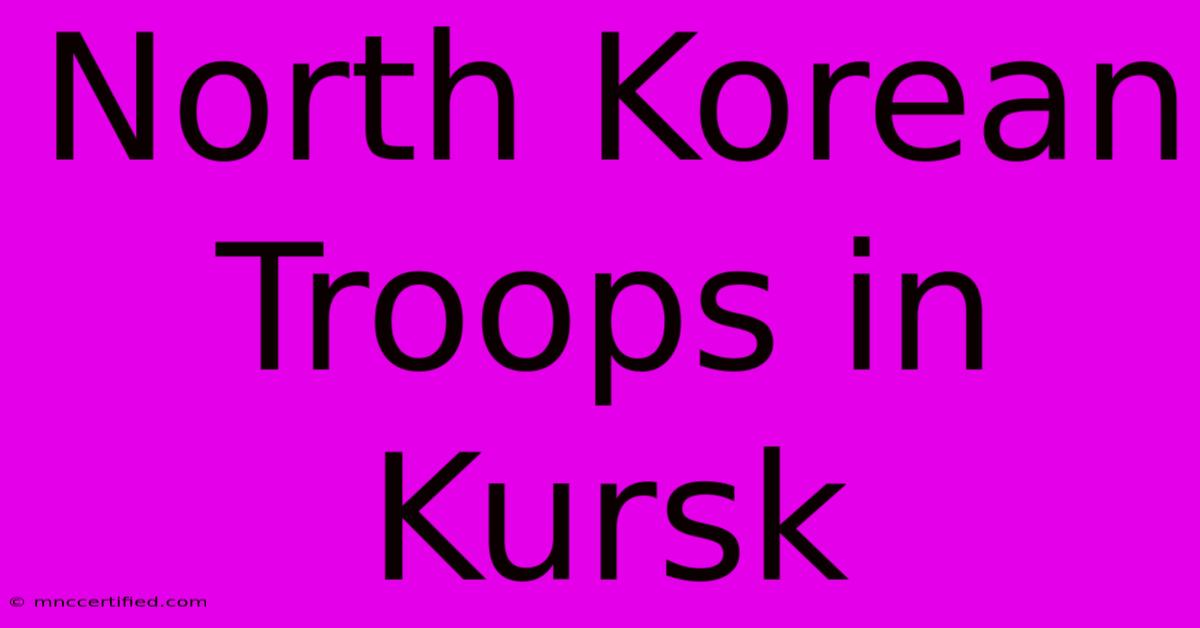North Korean Troops In Kursk

Table of Contents
The Enigma of North Korean Troops in Kursk: Separating Fact from Fiction
The claim of North Korean troops being present in Kursk, Russia, is a persistent yet unsubstantiated rumor that has circulated online and in certain media outlets. It's crucial to approach such claims with a healthy dose of skepticism and rely on verifiable evidence rather than speculation. This article will explore the evidence (or lack thereof), the potential motivations behind such a narrative, and the importance of critical thinking when evaluating online information.
The Absence of Credible Evidence
To date, no credible evidence supports the presence of North Korean troops in Kursk. Reputable news organizations, independent fact-checkers, and official statements from governments involved haven't corroborated these claims. This lack of corroboration is a significant red flag. Reliable reporting requires multiple, independent sources to confirm information, especially regarding sensitive geopolitical issues.
Analyzing the Claims: Common Fallacies
Many circulating claims rely on:
- Unverified social media posts: Social media platforms are breeding grounds for misinformation. Images and videos can be easily manipulated or taken out of context. Always cross-reference information with trustworthy sources.
- Conspiracy theories: The narrative often links the alleged presence of North Korean troops to broader conspiracy theories, weakening its credibility. Conspiracy theories thrive on speculation and lack of evidence.
- Lack of official confirmation: The absence of official statements from Russian or North Korean governments, or international organizations, should raise serious doubts. Official denials, while not definitive proof of absence, are still significant in evaluating the validity of the claim.
Potential Motivations Behind the Narrative
The spread of this misinformation could stem from various sources:
- Propaganda: Some actors may intentionally spread false narratives to sow discord or manipulate public opinion. Understanding the potential geopolitical motivations behind such narratives is key to critical analysis.
- Disinformation campaigns: State-sponsored or other malicious actors might employ disinformation to destabilize regions or undermine trust in official sources.
- Misinterpretation of information: Sometimes, legitimate reports on military movements or exercises can be misinterpreted or deliberately twisted to fit a false narrative.
The Importance of Critical Thinking and Fact-Checking
In the age of rapid information dissemination, critical thinking and fact-checking are paramount. Before accepting any information as fact, especially concerning sensitive topics like military deployments, it's essential to:
- Verify the source: Is it a reputable news organization, a well-established academic institution, or a government agency?
- Cross-reference information: Consult multiple sources to see if they corroborate the information.
- Check for bias: Be aware of the potential biases of the source and how they might affect the information presented.
- Look for evidence: Does the source provide concrete evidence, such as photographic or video proof, or eyewitness testimony?
- Use fact-checking websites: Reputable fact-checking websites can help verify the accuracy of information.
Conclusion: Prioritize Verified Information
The claim of North Korean troops in Kursk remains unsubstantiated. The lack of credible evidence, coupled with the reliance on unreliable sources and the presence of potential propagandistic motives, points to the likelihood of this being misinformation. Always prioritize verified information from trustworthy sources and develop robust critical thinking skills to navigate the complex information landscape. Remember, responsible information consumption is crucial in preventing the spread of false narratives and maintaining a well-informed society.

Thank you for visiting our website wich cover about North Korean Troops In Kursk. We hope the information provided has been useful to you. Feel free to contact us if you have any questions or need further assistance. See you next time and dont miss to bookmark.
Featured Posts
-
Robert Pleasant Insurance Dunn Nc
Nov 19, 2024
-
How Carr Shaped The Fcc Under Trump
Nov 19, 2024
-
Scotland 2 1 Poland Nations League Report
Nov 19, 2024
-
Home Inspector Insurance Coverage
Nov 19, 2024
-
New Dune Prophecy Episodes Dates
Nov 19, 2024